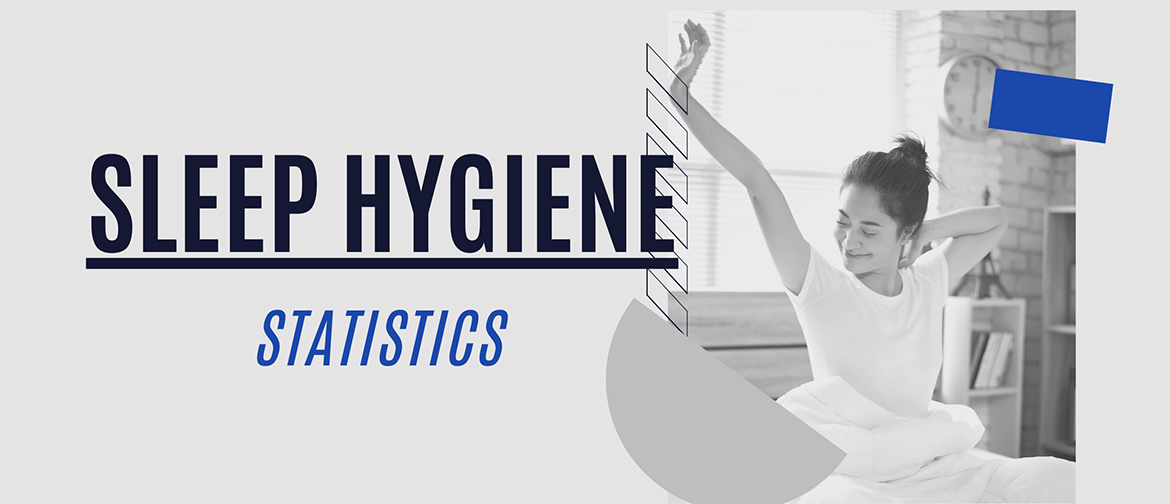Sleep is a vital part of our health and well-being. It affects how we feel, think, learn and behave.
Sleep hygiene refers to the practices that promote healthy sleep and good quality of sleep. Specifically, we investigated the role of digital devices on sleep hygiene results.
And in this article, we’re going to share what we discovered.
Our summary findings are as follows:
- 1) Besides sleep, using the phone on the bed ranked the next popular activity, amounting to 75% regardless of whether young or old, man or female. Put another way, 25% of people do not use phone in bed.
- 2) Playing music is the most popular relaxing ritual before sleep. 39.6% of people play music before sleep.
- 3) 1 out 4 people that use mobile phones 1 hour before sleep are not able to fall asleep within 10min.
- 4) Only 1 out 10 people do not change bed sheets at all.
- 5) People that pray or meditate before sleep tend to sleep better.
- 6) 3 out 10 of people that don’t exercise daily have the highest tendency of not able to fall asleep at night.
- 7) 27.7% of people take a nap that is between 1-30 minutes long. These people can sleep as quickly than people who don't take naps at all.
- 8) 43.6% of people exercise daily between 30 min to 1 hour and they have the least problem of not able to sleep.
- 9) Just before two hours before sleep, 5 out of 10 people snack, drink any caffeine and eat supper. 25.1% of people that snack before they sleep have problems sleeping right away.
- 10) On average, between 25 to 34 years old, 41% people do eat or snack on the bed.
75% of People Use Phones in Bed
We identified 6 common activities in bed. Besides sleeping, using your phone on the bed is a popular activity. 75% of people use their phone on the bed regardless of age or gender.
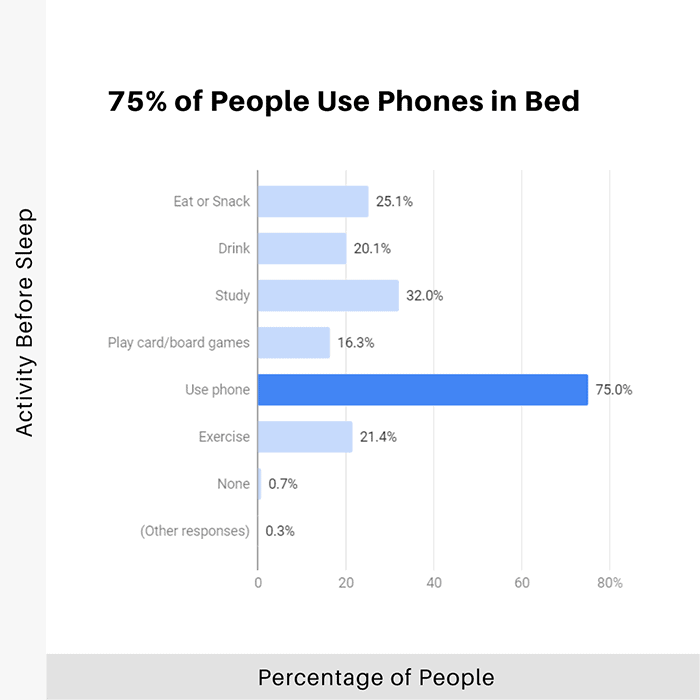
The data shows us that an increasing number of people spend time on their devices while at rest or sleeping; this behaviour seems to be becoming normalized over time.
The next popular activity after talking on the phone is studying or reading in bed. On the other hand, a good portion of people eats and drink in bed. This activity is not typical.
Men and women of older ages are also holding their mobile device when they are in bed.
It’s no surprise that mobile devices have become a staple in our society. It seems like everywhere you look, people are on their phones, checking emails, texting with friends or playing games.
Loretta Breuning, the author of Habits of a Happy Brain, advises that we should only do relaxing things before bed. The phone is not relaxing unless you use it to read a calming book. And don’t use the phone for social interactions at night that can be triggering. For example, browsing videos or engaging in heated debates online late at night.
In the year 2019, the number of mobile users has far exceeded desktop users. According to Statista, the number of mobile users will keep increasing over the years.
Hence, it is important to understand the impact that mobile devices have on our lives, including our time in bed.
Key Takeaway: 3 out 4 people, of all ages, use their phone in bed
4 out of 10 People Play Music Before Sleep
We found that playing music is the most popular relaxing ritual before sleep. 39.6% of people play music before sleep.
We will explore the most common relaxing rituals people partake in before sleep, as well as their effectiveness in helping one fall asleep faster.
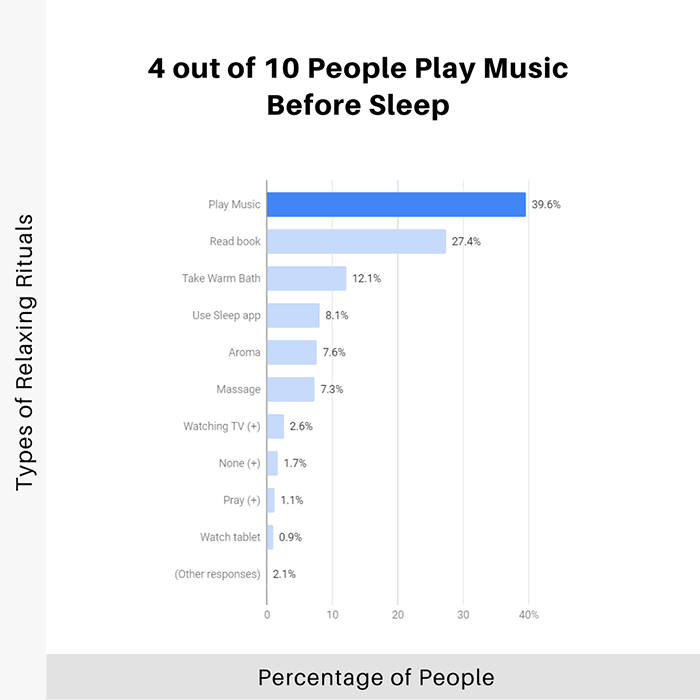
Playing music is the most common relaxing ritual before bedtime. Sleep music can help you relax and unwind so your mind will be ready to let go of the day’s events and drift off into dreamland.
People with this habit reported going to sleep much easier and having healthier sleeping habits than those without one.
The next popular relaxing ritual after music playing is reading in bed. We didn’t put the sleep app together with playing music. This is because we want to find out if a sleep app is popular.
Studies show that daily stress can cause the brain to be active. Everydayhealth says that if the brain is too busy, it is hard to fall asleep.
To relax the busy brain, the average person has a few rituals that they perform before sleep. Some of these might be taking a bath, reading a book, or going for a walk.
These rituals can help you relax and unwind before bedtime so that your mind is ready to let go of the day’s events and drift off into the world of dreams.
Key Takeaway: 4 out of 10 people play music before bedtime so that they can sleep.
76% of People That Use Phone Can Fall Asleep
Are there any effects of mobile phones usage before sleep on sleep? We found that 76% of people who use mobile phones 1 hour before sleep can still fall asleep within 10min.
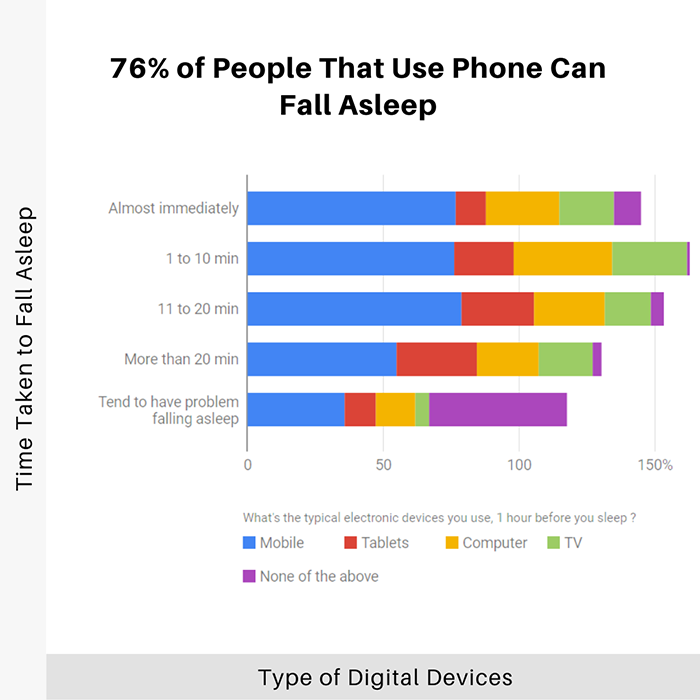
It is interesting to know that you might be able to fall asleep if you use a phone before bed. However, this does not suggest that the sleep quality is good.
It is a common belief that using the mobile phone before bedtime can disrupt sleep patterns. This is due to evidence linking exposure to the blue light emitted by these devices with disruptions of melatonin production, leading to sleepless nights.
According to sleep foundation, the same blue light also reduces total REM sleep, which affects the quality of sleep.
According to our findings, there is no correlation between using the phone just before sleep and falling asleep if the watch duration is short.
However, the ability to fall asleep also depends on how much digital content you watch throughout the day and what kind of content you watch just before you go to sleep. An example of wrong content to watch is a scary video.
Key Takeaway: In summary, 3 out of 4 people that use their phone before bed and are able to fall asleep fast. That also depends on the content watched, the watch duration before sleep and total screen time during the day.
10.2% of the People Change Bedsheets after 2 Months
Our research found that the majority (44.9%) changes bed sheets at least every 1 to 2 weeks, followed by 23.6% of people that changed bed sheets every 3 to 4 weeks.

Though changing bed sheets can be a chore, the majority still change bed sheets every 1 to 2 weeks.
The idea that a comfortable bed environment can make you sleep better is not new. We want to know if those who slept on freshly laundered sheets were significantly more likely to report sleeping well than those who had dirty sheets.
In 2012 by the National Sleep Foundation, a study finds that people are more excited to go to bed when they have freshly scented sheets.
On the other hand, dirty bed linen and mattress has more bacteria and dust mites accumulated, which might disturb your sleep.
The people with insomnia who sleep on freshly laundered sheets are more likely to enjoy a good night’s rest than those who go months without washing the bedding.
As such, cleanliness may affect how well one sleeps at night, as these individuals were found to have better quality sleep when they slept in fresh linens or clothes compared to wearing dirty ones.
Overall, we find support in suggesting that healthy practices such as regular laundering of bedsheets will improve sleep quality.
Key Takeaway: 9.2% of people that do not change bed sheets have the biggest problem to fall asleep.
People That Pray or Meditate Sleep Better
The power of prayer or meditation can be a source of comfort in times of need. It’s also been said to help people with anxiety and depression, relieve pain, lower blood pressure, and more.
Rutgers University researchers found that people who meditate or pray have more melatonin than people who do not. The increase ranges from 198% (average) to 300% (extreme).
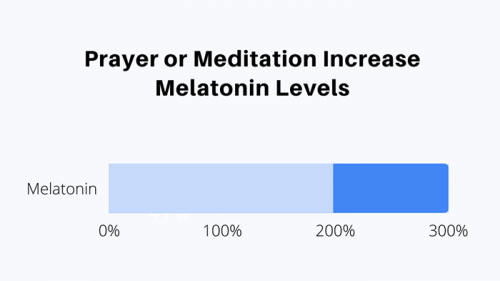
Melatonin is a natural hormone that helps you sleep. It makes your brain feel good so that you can sleep.
According to Huffpost, people who pray before bed helps in the quality of sleep.
Another study by Dr Spiegel found that people that pray before bed get more rest, as parts of the brain are involved in self-reflection and self-soothing.
We also thought about how praying might be beneficial for those with anxiety or depression symptoms because this activity allows them to reflect on what they are grateful for instead of ruminating over their negative thoughts, which is associated with these conditions.
Prayer may provide relief from pain as well since many people report feeling relaxed after having prayed and meditated.
Key Takeaway: The power of prayer or meditation can help sleep better. This has a positive impact on your health by making sure that you’re getting enough sleep each night.
33.3% of People Who Don't Exercise
Have More Problems With Sleep
We found that 33.3% of people don’t exercise at all. Put another way, 66.7% of people exercise every day. The majority of people (24.2%) do exercise of up to 30 min every day.
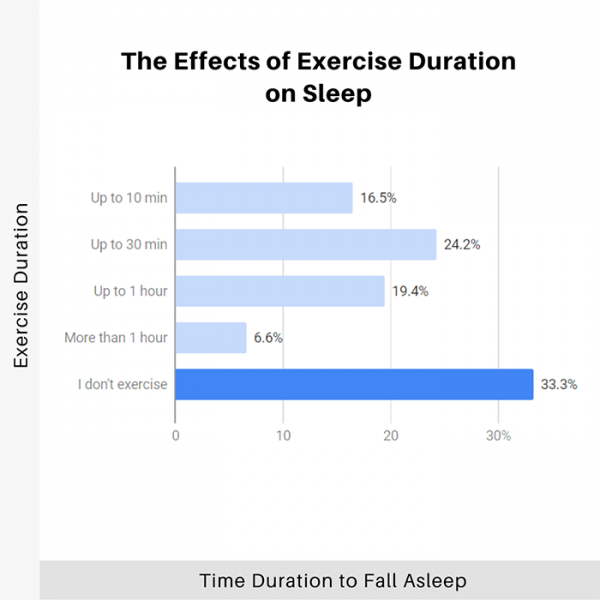
We want to know if people who don’t exercise are able to sleep as good as those that exercise regularly.

It is not so surprising that people who are inactive have a harder time falling asleep. It’s interesting to know, however, that those with a higher exercise regimen also find it difficult to fall asleep.
Active exercise for more than an hour can also affect your sleep.
There is a link between exercise and sleep. Regular exercise helps you sleep. People who don’t exercise often have sleeping problems.
Exercise has a lot of benefits, from reducing stress and depression to improving mood and overall cardiovascular fitness.
A study from the sleep foundation shows that people who exercise regularly have a much easier time getting to sleep and staying asleep.
On the other hand, a study shows that long and strenuous exercise has a negative effect on sleep. It is especially bad if you do it close to when you go to sleep.
Key Takeaway: 66.7% of people that exercise have a lesser problem falling asleep.
27.7% of People have a Short Nap and Sleep Fast
We notice almost 5 out of 10 people do not take a nap at all. Put another way, 5 out 10 people take a nap. Half of them take a longer nap of 30 minutes and more.
Napping is a great way to relieve stress, boost your energy and productivity levels, and increase your mood.
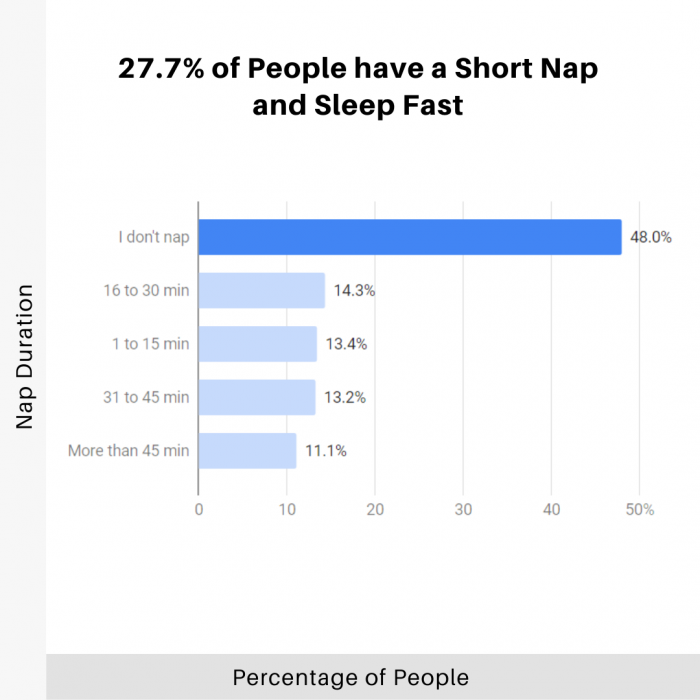
The majority of people do not nap during the day.
People who nap between 31 to 45 min tend to take 10 minutes to fall asleep at night.
Naps are a common occurrence in many people’s lives. Whether you’re feeling sleepy after lunch or waking up from a nap, they can be a great way to combat fatigue. It’s amazing how one can feel so refreshed after only a few minutes of sleep.
In most people, the perfect nap time is 15-20 minutes. This gives the body enough time to rest. It doesn’t go into a deep sleep, so people won’t feel drowsy afterwards.
After the post-lunch energy crash, many people lose focus. Studies show that the best time to nap is after lunch and before 3 pm. Napping after 3 pm can affect your night sleep.
You may want to let your schedule decide: if you only have 20 minutes to spare, take them.
However, if you sleep for up to one hour, you might really mess up your body’s sleep cycle. It can make you feel groggy and cranky because it takes longer to wake up from a deep sleep.
Key Takeaway: 48% of people don’t nap, and they have the least problem falling asleep.
43.6% of People Exercise Between 30 min to 60 min
We found that 43.6% of people exercise daily between 30 min to 1 hour, and they have the least problem of not able to sleep.
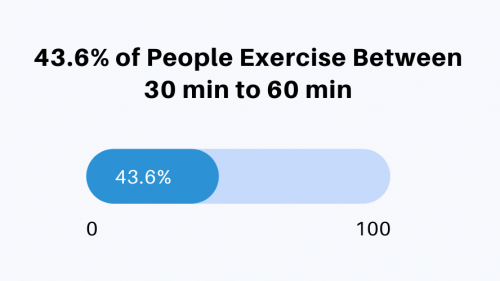
We want to know if an exercise duration of 30 to 60 minutes help in sleeping.
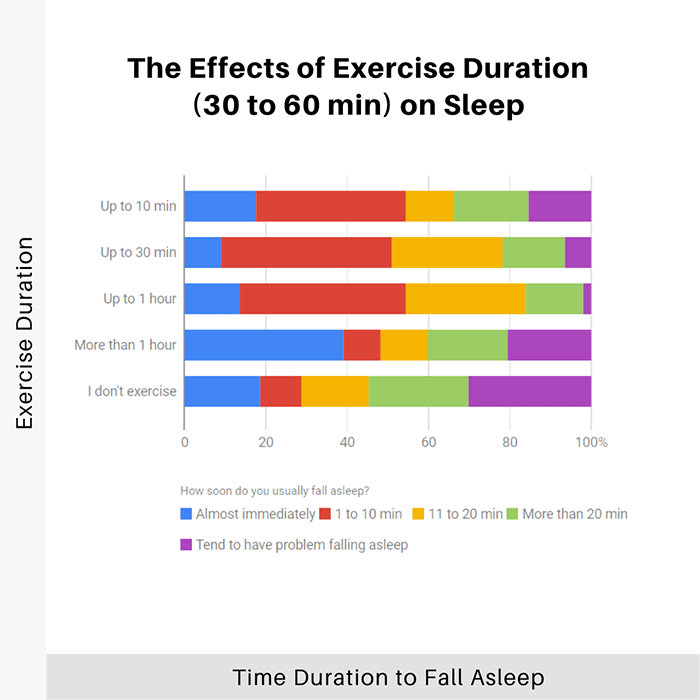
The problem of not able to sleep is the lowest for people who exercise between 30 min to 1 hour. Any exercise of more than an hour or people that don’t exercise tends to have problems sleeping.
The effect of exercise on sleep is a topic that has been researched for years.
Some studies have found evidence to support the idea that exercise can improve sleep, while lack of exercise is associated with insomnia.
It’s best if this amount of exercise happens during the day, not closer to bedtime. Regular exercise has been reported as one way of decreasing stress levels and anxiety, both leading factors on sleepless nights.
Key Takeaway: People (43.6%) that did a daily exercise of 30 min to 1 hour experience improve sleep.
25.1% of People Snack Can't Sleep Immediately
Across the typical activities we looked at, there was two main focus area on food and active exercise. We found 5 out of 10 people snack, drink any caffeine and eat supper 2 hours before sleep. Put another way, and the remaining 5 do not have any habits on food and active exercise 2 hours before sleep.
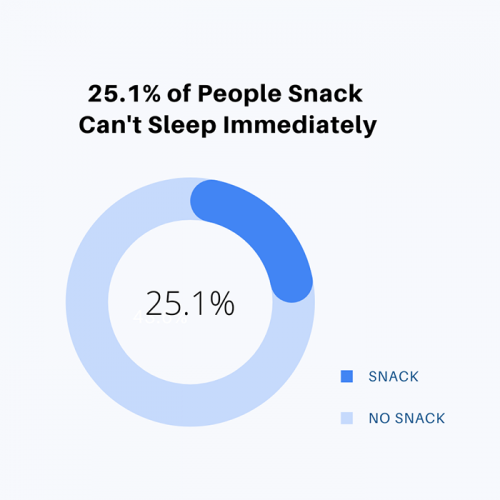
Note that we focus mainly on activities that may affect sleep.
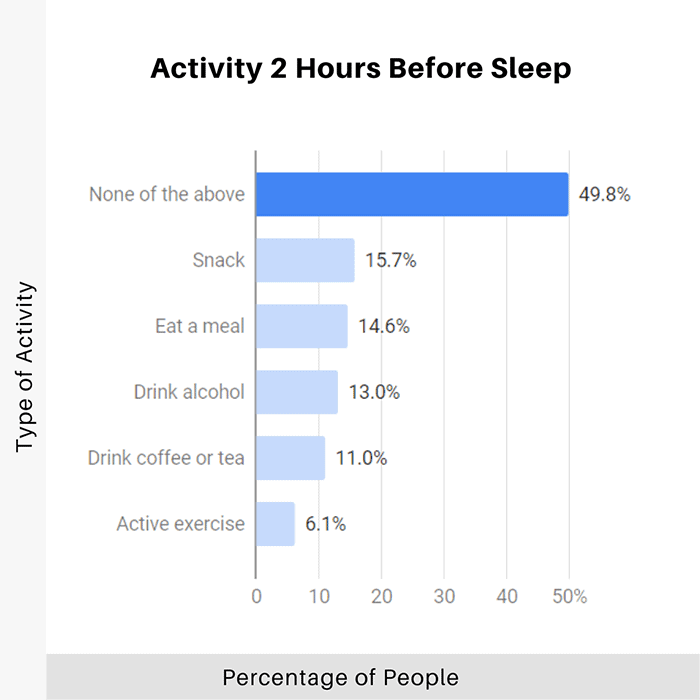
Should you eat and drink before sleep?
Some say the last thing you should do before bedtime is eating or drink, while others say it’s best to have a light snack or drink before going to sleep. We want to know the snacking or drinking habits just before sleep.
According to medical news today, certain eating or drinking can help to promote better sleep. On the other hand, excessive or wrong diet habits lead to poor sleep and health issues like weight gain.
A good diet before sleep can even promote better sleep. However, certain food or drinks that contain any caffeine will disrupt the natural digestion cycle, which creates internal noise and leads to insomnia and other sleep problems.
Key Takeaway: 74.9% of people that don’t snack find it easier to sleep right away.
41% of Millennials Eat or Snack in Bed
We found that the age group of 25 to 34 is the most likely to eat and drink in bed. People from 35 to 44 years old prefer to play cards/board games and read in bed.
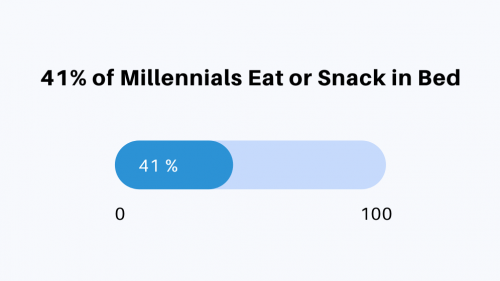
It is not surprising that phone usage on bed tops the chart. The study remains popular, followed by eating and drinking.
In general, eating in bed is not a habit that is conducive to good sleep hygiene. This activity can become a common thing that people do when bored, tired, or want to feel comfortable and cosy.
Although eating in bed may seem harmless, it can lead to some negative health consequences.
Eating on your bed can lead people to some health consequences like weight gain or indigestion.
So if someone has sleep problems before, they should also be careful about where they eat and the hygiene.
People should also be careful about hygiene if they have sleep problems before too. The food crumbs on their bedsheets can lead people to some allergies or even get an infection like a skin rash caused by bacteria from eating in bed.
It is strongly recommended not to eat on your bed if you want to maintain healthy habits and avoid unnecessary risks for any illness.
Key Takeaway: 4 out 10 millennials do eat or snack in bed.
Conclusion
That’s it for the list of sleep hygiene statistics.
If you’re interested in learning more about how we collected and analyzed the data for this study, here is a PDF of our methods.
And now I’d like to hear from you:
What’s your #1 takeaway from this research?
Or maybe you have a question.
Either way, go ahead and leave a comment below.

